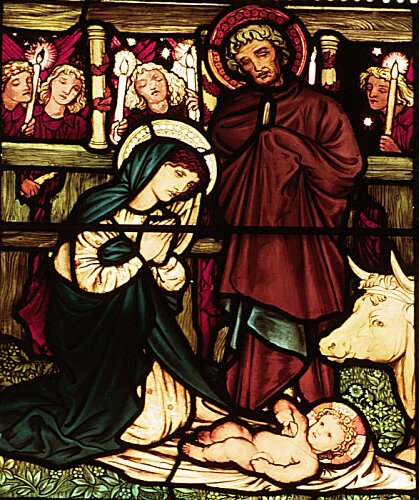Fra Angelico, The Annunciation, Convento di San Marco, Florence, 1430s
Then Mary said, "Here am I, the servant of the Lord; let it be with me according to your word [NRSV, Luke 1:38a].
The Fourth Sunday of Advent
December 18, 2011
Click to go immediately to:
1) The Music Programme Homepage
3) The Concert Calendar
_______________

Edward Burne-Jones / William Morris, Nativity, Trinity Church, Saugerties, New York
Listen to La Nativité du Seigneur online performed by Messiaen himself, Jennifer Bate, Olivier Latry, and Simon Preston (click on name).
________________
![[O-Eric-Gill-739634.jpg]](https://blogger.googleusercontent.com/img/b/R29vZ2xl/AVvXsEg4wyTZr5-BFDnDyFPm9qsiivDnTuwAN4s3o2VL_tBecA043fSVQQjZy6TfBuXMtT6VGxfarFrJ8hTKn1Rhx2iPTMMf_KoPlLjJkwgsOFodI_WyQIh-X0fuNrS-RMNNUkwEWPSHoC35FBY/s1600/O-Eric-Gill-739634.jpg)
Eric Gill: O
The O Antiphons are very much a part of Advent prayer. They had their origin as antiphons for the Magnificat in Roman Catholic vespers during the week before Christmas.
Click to read about he O Antiphons and listen to a number of different versions.
________________
The organ voluntaries for evensong this coming Sunday are both chorale preludes, Nun komm, der Heiden Heiland.
Zanobi Strozzi (attrib.), Nativity, Metropolitan Museum of Art, New York, 1412-68
Nun komm, der Heiden Heiland (orig.: Nu kom der Heyden heyland, Engl.: Now come, Saviour of the gentiles) is a Lutheran chorale of 1524 with words written by Martin Luther, based on Veni, redemptor gentium by Saint Ambrose. The chorale was used as the prominent hymn for the first Sunday of Advent for centuries. It was used widely in organ settings by Protestant baroque composers. It is now best known as the base for Johann Sebastian Bach's chorale cantata Nun komm, der Heiden Heiland, BWV 62 (1724) and the opening movement of his cantata Nun komm, der Heiden Heiland, BWV 61 (1714).
This chorale continues in modern usage, both in liturgically oriented Christian hymnals (for example, the Lutheran Book of Worship) and as the cantus firmus for organ compositions. (Wikipedia)
Veni, Redemptor gentium [Latin text] [English trans. by John Mason Neale]
Nun komm, der Heiden Heiland [German text by Martin Luther]; [English trans. by William Morton Reynolds]
Johann Sebastian Bach, Nun komm, der Heiden Heiland, Cantata 61 [listen]
Johann Sebastian Bach, Nun komm, der Heiden Heiland, Cantata 62 [listen]
Johann Sebastian Bach, Nun komm, der Heiden Heiland, Chorale prelude, BWV 659 [Kibbie: listen]
Dietrich Buxtehude, Nun komm, der Heiden Heiland, Chorale prelude, BuxWV 211, [Vincenzo Ninci]: YouTube]
Johann Pachelbel, Nun komm, der Heiden Heiland, Chorale prelude [Monika Koepke: YouTube]
Nicolaus Bruhns, Nun komm, der Heiden Heiland, Chorale prelude [Jean-Luc Ho: YouTube]
Karl Stiller, Nun komm, der Heiden Heiland, Chorale prelude [YouTube]
Michael Praetorius, Nun komm, der Heiden Heiland, chorale [La Capella Ducale: YouTube]
Georg Philipp Tellemann, Nun komm, der Heiden Heiland, chorale [Erie Renaissance Singers: YouTube]
_______________
Bach Cantata for the 4th Sunday of Advent
Click to go to Johann Sebastian Bach, Bereitet die Wege, bereitet die Bahn! / Prepare the ways, prepare the path!, Cantata 132, with performances by Leonhardt, Leusink, and Richter.
MaÎtre François, John the Baptist Preaching, Koninklijke Bibliotheek, The Hague, c.1475-80

